Russia-Ukraine war: more than 200 bodies found in Mariupol basement; invasion in ‘most active phase’, says Ukraine – live
More than 200 bodies found in Mariupol basement, says official
The bodies of more than 200 people have been discovered in the rubble of a high-rise apartment building in the Ukrainian port city of Mariupol, according to a Ukrainian official.
Petro Andryushchenko, an adviser to Mariupol’s mayor Vadym Boychenko, said workers found the bodies while digging through a basement underneath the collapsed building.
Andryushchenko wrote on Telegram:
During the dismantling of the blockages of a high-rise building near the suburban gas station about 200 bodies were found dead in the basement under the blockages with a high degree of decomposition.
Due to the refusal of locals to collect and pack the bodies of the dead, the Russian ministry of emergencies left the work site.
Anton Gerashchenk, an adviser to Ukraine’s internal affairs ministry, said Russian forces had tried to force locals to take the bodies out. When they refused, the grave site was simply abandoned, he said.
It has not been possible to independently verify this information.
Ukrainian soldiers captured at Azovstal plant in ‘satisfactory’ conditions
Isobel Koshiw
Ukrainian soldiers captured by Russian forces after the three-month siege of the Azovstal steel plant are being held in “satisfactory” conditions, according to the unit commander’s wife, amid uncertainty over the fate of the prisoners.
Denys Prokopenko, commander of the Azov battalion, was able to briefly call his wife, Kateryna, who said she had also been told that the prisoners had not been subjected to violence. It was not immediately clear if Prokopenko had been able to speak freely during the conversation.
“He said he was ‘OK’ and asked how I was,” Kateryna Prokopenko told the Guardian on Tuesday. “I’ve heard from other sources that the conditions are more or less satisfactory.”
At least 1,000 Ukrainian fighters, including members of the Azov battalion, were transferred to Russian-held territory last week after the Azovstal steel plant in Mariupol was taken by Russian forces.
Kateryna Prokopenko, the wife of the Ukrainian commander of the Azov regiment that led the defence of Mariupol, Denys Prokopenko.Photograph: Natacha Pisarenko/AP
The Azov battalion has played a central role in Russia’s justification for its invasion, which was originally launched with the supposed goal of “denazification”. Officials in Kyiv have suggested they could be swapped in a prisoner exchange, but some Russian officials have called for them to face trial or even execution on “terrorism” charges.
Previously, the only news of the fighters’ conditions had come via a news channel given access to the prison by the Russian Ministry of Defence. The International Committee of the Red Cross, which is involved in monitoring the conditions for prisoners of war and has a long-held policy of not publicly commenting, has not issued a statement.
“They are being fed, given water. The conditions meet the requirements and they have not been subjected to violence during this short period,” said Kateryna Prokopenko. “What will happen next, of course, we don’t know but at the moment there are third parties – the UN and the Red Cross – who are controlling the situation.”
Most of the injured Azov fighters are being held in a prison in Olenivka, a village in Russian-occupied Donetsk, but a smaller group of severely injured fighters are in a hospital in the town of Novoazovsk, also in Russian-occupied Donetsk. Prokopenko said that to her knowledge none of the fighters have been taken to Russia.
Read more:
Zelenskiy calls for heavy weapons aid in nightly address
Three months into the Russian invasion, Ukraine’s president Volodymyr Zelenskiy said that the country has survived “thanks to the tens of thousands of feats of all those who defend the state. And at the cost of tens of thousands of lives of Ukrainian men and women killed by the occupiers.”
In his daily address, he said that the situation in Donbas remained dire. “The situation in Donbas is extremely difficult,” he said. “In fact, all the strength the Russian army still has was thrown there to attack. Lyman, Popasna, Severodonetsk, Slovyansk – the occupiers want to destroy everything there.”
He then reiterated a need for heavy weapons:
Therefore, the supply of heavy weapons to Ukraine – MLRS, tanks, anti-ship and other weapons – is the best investment in maintaining stability in the world and preventing many severe crises that Russia is still planning or has already provoked.
We continue to work to ensure that Ukraine receives reliable security guarantees after this war. In particular, an international advisory group headed by Yermak and former NATO Secretary General Rasmussen has been set up. The group will include leading experts in the fields of security and defense, diplomacy. Their task is to develop a format of guarantees that will really work. And not for several months or years, but during the lifetime of many generations of our Ukrainians.
The governor of Ukraine’s eastern Lugansk region said the situation there “is only getting worse” as Russian troops advance.
“The situation is very difficult and unfortunately it is only getting worse. It is getting worse with every day and even with every hour,” said governor Sergiy Gaidai. “Shelling is increasing more and more.” He added that the Russians are focused on the key city of Severodonetsk.
“The city is being bombed by aviation, shelled by multiple launch rocket systems, artillery, mortars, tanks,” he said. “They are simply eliminating Severodonetsk from the earth.”
US to close avenue allowing Russia to pay debts via American banks
The US Treasury Department said it will not renew the license allowing Russia to pay debts via American banks.
The AP reports:
Since the first rounds of sanctions, the Treasury Department has given banks a license to process any dollar-denominated bond payments from Russia. That window expires at midnight May 25.
There had already been signs that the Biden administration was unwilling to extend the deadline. At a press conference heading into the Group of Seven finance minister meetings in Koenigswinter, Germany, last week, Treasury Secretary Janet Yellen said the window existed “to allow a period of time for an orderly transition to take place, and for investors to be able to sell securities.”
“The expectation was that it was time-limited,” Yellen said.
Without the license to use U.S. banks to pay its debts, Russia would have no ability to repay its international bond investors. The Kremlin has been using JPMorgan Chase and Citigroup as its conduits to pay its obligations.
“The majority who wanted out have gotten out. The only issue is finding buyers,” he said.
The Kremlin appears to have foreseen the likelihood that the U.S. would not allow Russia to keep paying on its bonds. The Russian Finance Ministry prepaid two bonds on Friday that were due this month to get ahead of the May 25 deadline.
The next payments Russia will need to make on its debts are due on June 23. Like other Russian debt, those bonds have a 30-day grace period — which would cause default by Russia to be declared by late July, barring the unlikely scenario that the Russia-Ukraine war would come to an end before then.
Investors have been almost certain of Russia going into default for months now. Insurance contracts that cover Russian debt have priced a 80% likelihood of default for weeks and rating agencies like Standard & Poor’s and Moody’s have placed the country’s debt deep into junk territory.
Russia has not defaulted on its international debts since the 1917 Revolution, when the Russian Empire collapsed and the Soviet Union was created. Russia defaulted on its domestic debts in the late 1990s during the Asian Financial Crisis, but was able to recover from that default with the help of international aid.
A Russian default this time will likely have little-to-minimal impact on the global economy, Auslander said, since Russia has been cut off from global financial markets for months now and investors have been expecting a default. Biden officials have made similar statements.
Here’s an exclusive from the Guardian’s Kate Connolly: Pete Buttigieg, the US transportation secretary, has backed a recovery programme for Ukraine in the style of the Marshall plan, which helped rebuild Europe after the second world war.
Connolloy writes:
With the memory of the Marshall plan in mind, what we’re talking about is not only about how we fund immediate needs and support their ability to maintain the war effort, but how we support the ability of Ukraine to be economically viable and generate a sustainable future for themselves, even as they’re under attack,” the former presidential candidate said in an interview with the Guardian.
Buttigieg admitted that while “the destruction of Ukrainian homes and infrastructure is still under way”, to talk about reconstruction might feel premature “and yet in my encounters with Ukrainian leaders, and particularly my counterpart [Oleksandr Kubrakov], who I speak to regularly, they are already thinking about reconstruction even as they’re thinking about defending their homeland and it’s inspiring to see and it deserves strong and unified support from us.”
He said a “major topic of conversation” among transport ministers at the world meeting in Leipzig this week for the International Transport Forum was how they could help to get grain and other produce out of Ukraine, which is stuck because of blocked and destroyed ports and railway lines and is threatening to create a global food shortage.
“This is not only something that concerns us, as friends to Ukraine, but also concerns us because the world needs that production, especially on the agricultural side,” he said.
“Without access to the Black Sea, it’s always going to be a major disadvantage. We’re committed to helping there in any way we can.
“But I really admire in my Ukrainian counterparts that they’re thinking about the short and the long term at the same time – how to shore up infrastructure in the immediate term – the heroic work by the railway workers to restore connections so that goods can be moved from west to east and people from east to west.
“But they’re also thinking about very long-term questions and recognising that what they rebuild towards will not simply be a reconstruction of the Soviet-era infrastructure that this generation of Ukrainians has inherited.”
Buttigieg was speaking on the sidelines of an event hosted by the German Marshall Fund NGO in Berlin to mark the 75th anniversary of the Marshall plan, a multibillion-dollar recovery programme initiated by the US in 1947 that provided humanitarian and economic assistance to millions of Europeans to ease their recovery after the second world war.
Read more:
This is Maanvi Singh in San Francisco, taking over the blog from my colleagues Maya Yang and Joanna Walters. I’ll bring you live updates for the next few hours.
Maya Yang
Ukraine’s military said Russian troops had killed at least 14 civilians and injured 15 more on Tuesday during mass attacks in the eastern Luhansk and Donetsk regions, the focus of Moscow’s latest offensive, Reuters reports.
In a Facebook post it said Russian troops had used aircraft, multiple rocket launchers, artillery, tanks, mortars and missiles in their assault on the two regions, large parts of which are controlled by Russian-speaking separatists.
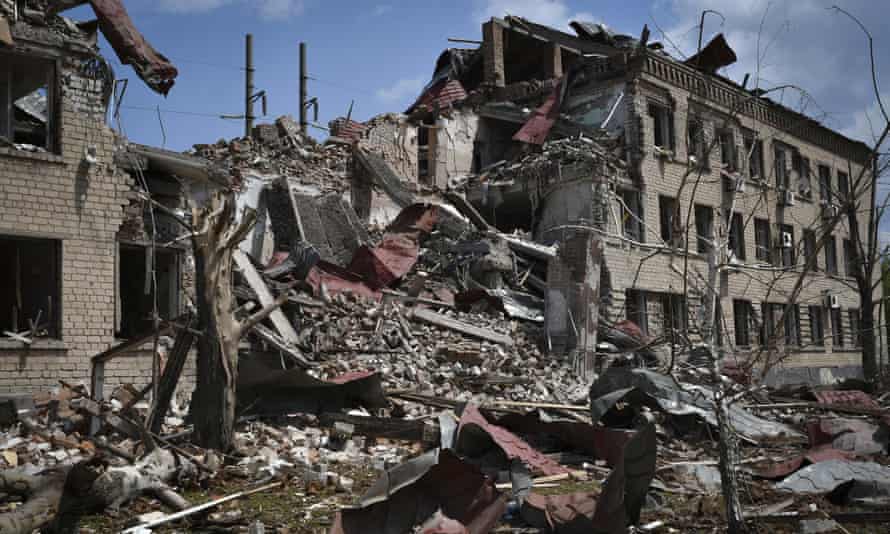
Maya Yang
Ukrainian prosecutors have launched a war crimes investigation in Kharkiv’s Gorky Park, Agence France-Presse reports.
Prosecutors took up the case to ensure that the park, which was hit by around 50 shells in three months of war, could be open without the public being at risk and, above all, determine whether the attacks constitute a war crime.
Hitting civilian targets, civilian infrastructure, trying to kill civilians and destroy cultural heritage, are considered war crime. An error can happen once or twice, but there are 56 hits recorded. It’s not an accident. They were targeting the park,” said Ukrainian prosecutor Roman Petrenko.
The shells also hit a small theatre and a closed restaurant in the park. The shrapnel even reached and damaged bronze sculptures of children scattered around the park.
For John Culp, a retired US soldier and American de-miner from the US-based non-profit Bombs Tech Without Borders, there was no doubt the Russians were targeting the park deliberately:
“We are in Gorky Park.. With its paths, its stages etc.. We are investigating the fact that many rockets and shells were fired in and near the park. There is no military target here. It was done knowingly to cause terror and fear among the civilian population,” said Culp, who is helping advise his Ukrainian counterparts.
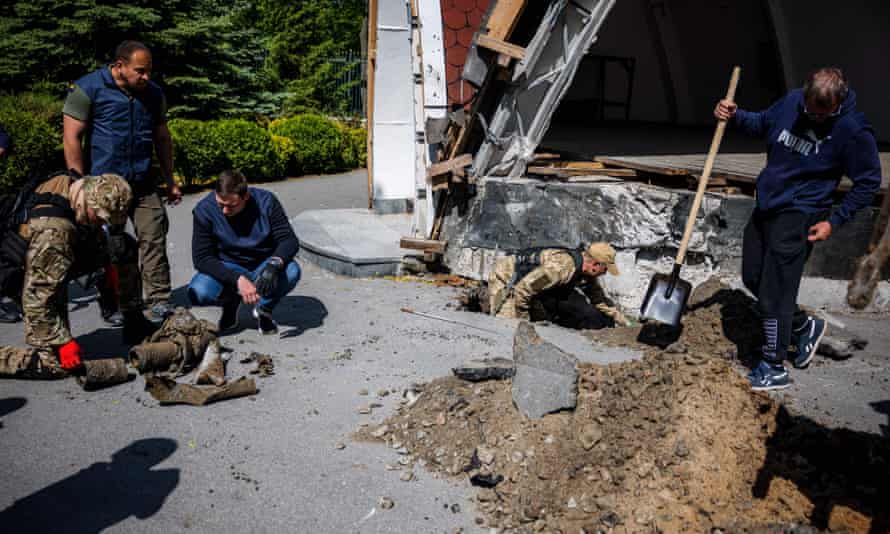
The self-proclaimed leader of the Moscow-backed separatist region of Donetsk has said Russian and separatist forces were fighting to take full control of the town of Lyman and have already captured half of it, Agence France-Presse reports.
The active phase of the liberation of Krasny Liman is underway,” separatist leader Denis Pushilin said on the pro-Kremlin Solovyov Live YouTube programme.
Located in the north of the eastern Donetsk region, Krasny Liman is the old name of the Ukrainian town of Lyman.
Lyman lies on the road to Sloviansk and Kramatorsk, the capital of the Ukrainian-controlled part of the region of Donetsk.
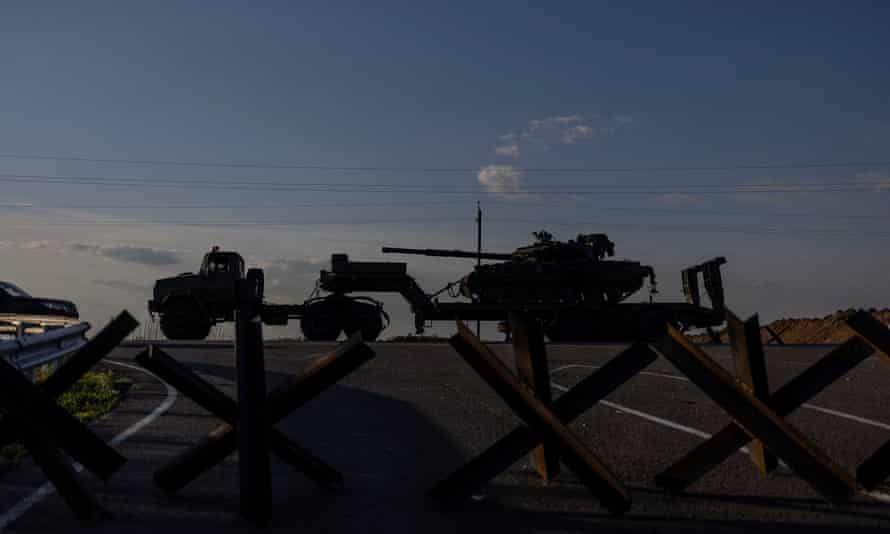
Pushilin said the Russian army and separatist troops have entered the town and controlled around half of it.
Krasny Liman will also soon be a liberated settlement. Svyatogorsk will come afterwards and then Slavyansk.”
He said Russian and separatist forces have now taken control of 28 settlements in the north of the region of Donetsk.
Svyatogorsk (Svyatogirsk in Ukrainian) and Slavyansk (Sloviansk in Ukrainian) are also located in the region of Donetsk.
There was no immediate comment from Russia and Ukraine. Pushilin’s claims could not be independently verified.
Russia is focused on securing and expanding its gains in the eastern Donbas region, near the border and home to pro-Russian separatists, as well as the southern coast.
Separately, the Ukrainian army announced that Russians were now in control of town of Svitlodarsk, also in the Donetsk region.
Regional governor Pavlo Kyrylenko said on Telegram that Ukrainian troops “have regrouped to take a more favourable position”.
Reuters adds that Russian forces were in the process of an all-out assault to encircle Ukrainian troops in twin cities straddling a river in eastern Ukraine on Tuesday, a battle which could determine the success or failure of Moscow’s main campaign in the east.
Civilians had been evacuating from the area around Lyman earlier in May.
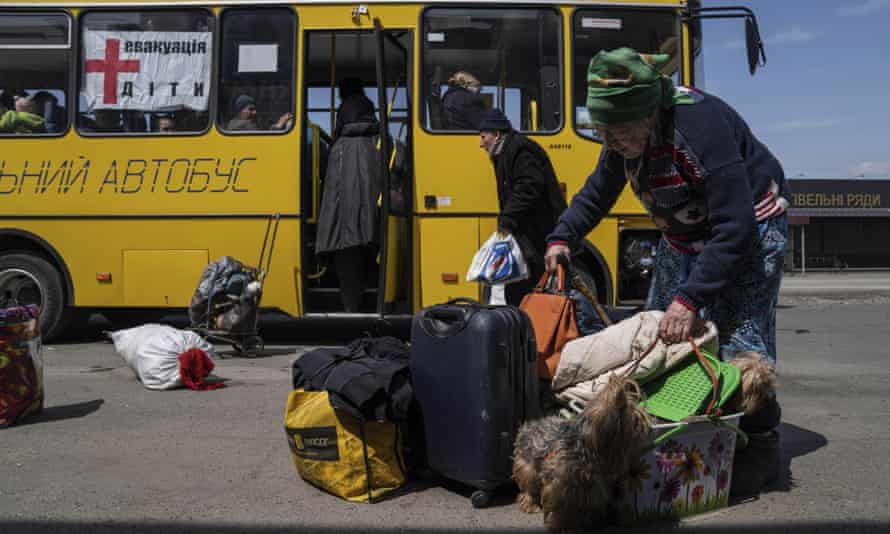
Summary
It is 9pm in Kyiv. Here’s where we stand:
- The bodies of more than 200 people have been discovered in the rubble of a high-rise apartment building in the Ukrainian port city of Mariupol, according to a Ukrainian official. Petro Andryushchenko, an adviser to Mariupol’s mayor Vadym Boychenko, said workers found the bodies while digging through a basement underneath the collapsed building.
- A Russian court has rejected an appeal from opposition leader Alexei Navalny against a nine-year prison sentence he is serving for large-scale fraud and contempt of court, charges which he denies. Navalny lambasted President Vladimir Putin during court hearing, casting him as a madman who had started a “stupid war” in Ukraine based on lies.
Russian forces seize control of Svitlodarsk and two other Donetsk towns, says governor
Russian forces have taken control of three Donetsk region towns including Svitlodarsk, according to the regional governor, Pavlo Kyrylenko.
Svitlodarsk is 80km southwest of the besieged city of Sievierodonetsk, which has been under intense bombardment in recent days.
Earlier today, it was reported that Russian forces had entered Svitlodarsk and hung up a Russian flag over the city administration building.
Canada has purchased 20,000 artillery rounds of Nato standard ammunition for Ukraine to support it in its defence against Russia’s invasion, defence minister, Anita Anand, said.
The ammunition was purchased from the US for about C$98m (£61m) and would soon be delivered to Ukraine as a donation.
They can be fired from artillery cannons, including the M777 Howitzers that Canada has already sent.
Anand said the shipment of military aid will be “critical in Ukraine’s current struggle to defend its eastern territory,” and that “work is already underway to deliver this aid to Ukraine as soon as possible”.
Russia’s foreign ministry has announced a ban on 154 members of the British parliament’s House of Lords on entering the country, in a tit-for-tat move for sanctions against Russian officials over Ukraine.
The ministry said the 154 people “made a direct contribution to the development of London’s anti-Russian sanctions” aimed at creating conditions for the “political isolation of Russia and the destruction of its economy”.
It also accused them of having “used their authority to whip up anti-Russian hysteria in the UK” and “pandered to the Russophobic political course of the British Conservative government”.
Those blacklisted include William Hague, a former foreign minister and leader of the Conservative Party in opposition.
Notably, the list does not include Evgeny Lebedev, the Russian-born press baron who was controversially granted a peerage by Boris Johnson’s government in 2020.
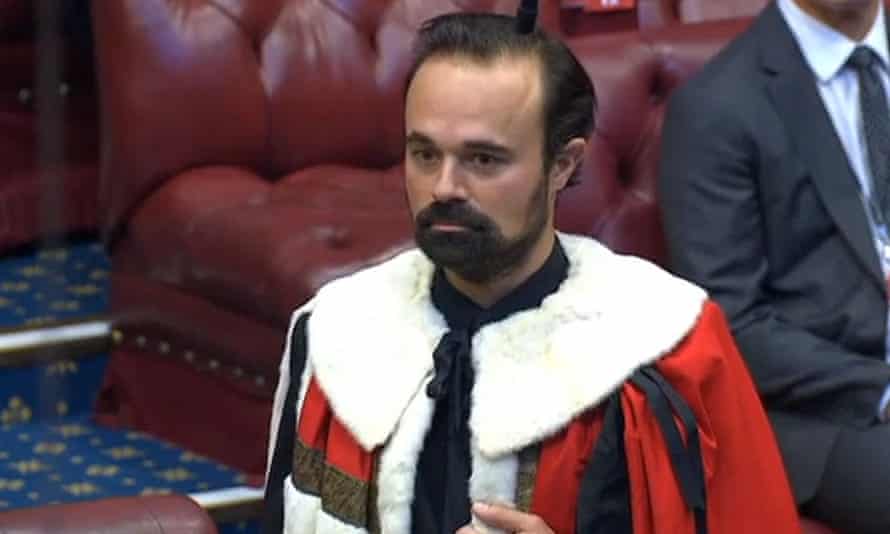
Questions have been raised about Johnson’s close ties to Lebedev, who owns the London Evening Standard and Independent newspapers, as his father Alexander has admitted he was a KGB agent.
Here’s a bit more detail from Ukraine’s defence ministry spokesperson, Oleksandr Motuzyanyk, who said battles being fought in eastern Ukraine could determine the country’s fate.
During a televised briefing, Motuzyanyk said:
Now we are observing the most active phase of the full-scale aggression which Russia unfolded against our country.
The situation on the (eastern) front is extremely difficult, because the fate of this country is perhaps being decided (there) right now.
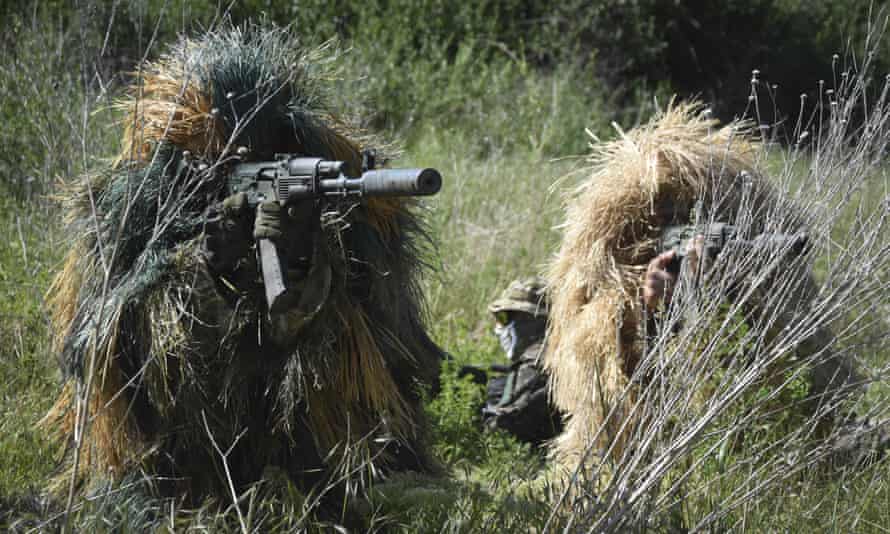
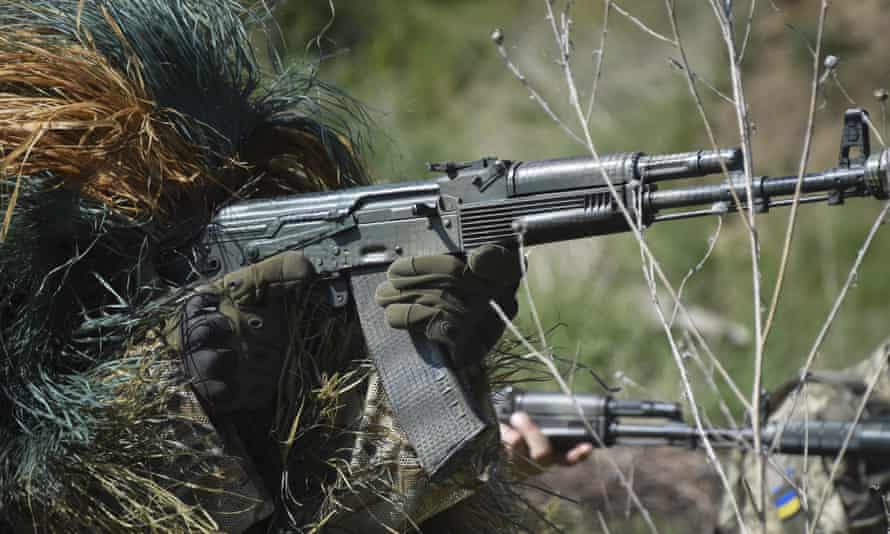
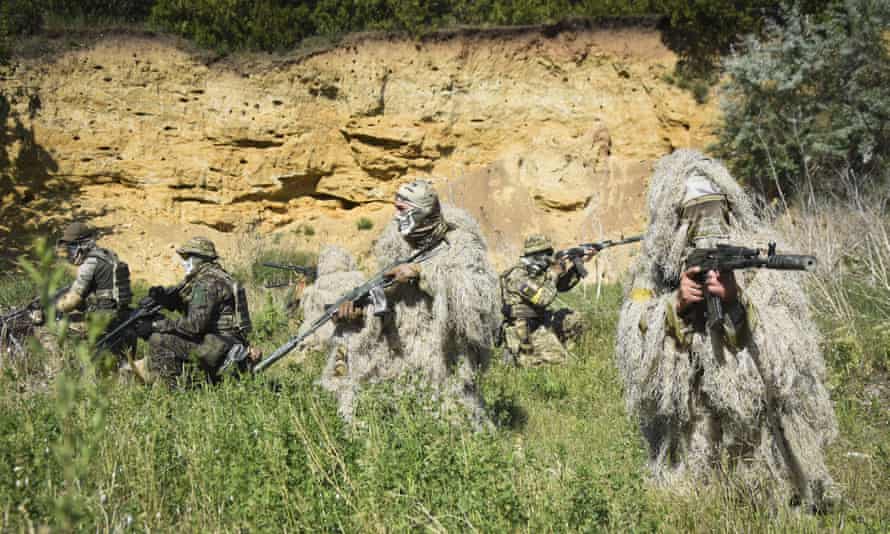
Russia’s invasion in ‘its most active phase’, says Ukraine
Russia’s military campaign in Ukraine has entered its most active phase, according to Ukraine’s defence ministry spokesperson, Oleksandr Motuzyanyk.
Russian forces are trying to encircle Ukrainian troops in two cities straddling the Siverskyi Donets river in eastern Ukraine – Sievierodonetsk and Lysychansk.
Motuzyanyk said Russian forces had not given up attempts to cross the river, Reuters reports.
Today so far..
It is 6.30pm in Kyiv. Here’s where we stand:
- The governor of Luhansk has delivered a grim warning that it is too late for thousands of civilians to be evacuated from the besieged city of Sievierodonetsk. Surrounded on three sides by Russian forces who have been attempting to complete their encirclement of the pocket around the city, Sievierodonetsk and the towns and villages to its west have been under intense bombardment in recent days. Fifteen thousand residents were still believed to be in the city hiding in shelters.
- The bodies of more than 200 people have been discovered in the rubble of a high-rise apartment building in the Ukrainian port city of Mariupol, according to a Ukrainian official. Petro Andryushchenko, an adviser to Mariupol’s mayor Vadym Boychenko, said workers found the bodies while digging through a basement underneath the collapsed building.
- A Russian court has rejected an appeal from opposition leader Alexei Navalny against a nine-year prison sentence he is serving for large-scale fraud and contempt of court, charges which he denies. Navalny lambasted President Vladimir Putin during court hearing, casting him as a madman who had started a “stupid war” in Ukraine based on lies.
Hello everyone. It’s Léonie Chao-Fong with you as we unpack all the latest developments on the war in Ukraine. Feel free to drop me a message if you have anything to flag, you can reach me on Twitter or via email.
Hungary’s prime minister, Viktor Orbán, said Budapest was not in a position to agree to the EU’s proposed new sanctions, including an oil embargo on Russia.
In a letter to the European Council’s president, Charles Michel, Orbán said it was “unlikely” a solution could be found by next week’s summit of EU leaders and that leaders should not discuss the issue at the meeting.
The letter reads:
Looking at the gravity of the issues still open, it is very unlikely that a comprehensive solution could be found before the special meeting of the European Council on 30-31 May.
Orbán said he was “convinced” that discussing the sanctions package “in the absence of a consensus would be counterproductive”, adding that it would only highlight the internal divisions without offering a realistic chance of resolving them.
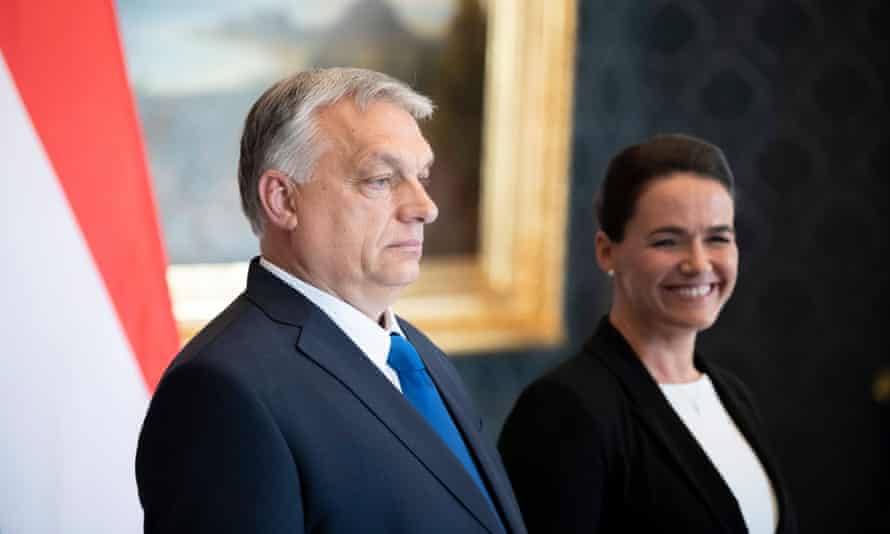
Hungary relies on Russian oil from a single pipeline and its leader has argued that an embargo would devastate the country’s economy. The EU has offered Budapest, as well as Slovakia and the Czech Republic, lengthy exemptions from imposing the embargo.
Despite this, the president of the European Commission, Ursula von der Leyen, said it was a only “matter of weeks” for the EU to agree on an embargo on Russian oil.
Speaking to CNN, she said:
We are working hard on it right now, it’s a matter of weeks but we really must find a solution for the investment needs.
Therefore, this is important, we have to tailor it in a way that we do not have the situation that Putin can take the oil. That he doesn’t sell it to us and [then] sells it at a higher price on the world market.
82% of Ukrainians against any territorial concessions in peace deal with Russia – poll
A new survey has found that 82% of Ukrainians believe that their country should not sign away any of its territories as part of a peace deal with Russia under any circumstances.
Researchers at the Kyiv International Institute of Sociology spoke to 2,000 adult citizens of Ukraine between 13 and 18 May.
They found that 82% of respondents said they did not support territorial concessions.
Only 10% believed that some territories could be abandoned in order to achieve peace and preserve independence, researchers said.
According to the poll, 77% of Ukrainians living in Russian-occupied territory opposed any land concessions.
In the east of the country where the most intense fighting with Russian forces is currently taking place, only 19% of respondents said they were ready to make territorial concessions; 68% said they were against.
In the south of Ukraine, 83% of respondents said they were against any territorial concessions and 9% found it acceptable for Ukraine to concede territory to achieve peace.
From Politico’s Christopher Miller:
Amid foreign chatter about Ukraine making a peace deal or concessions to end Russia’s war against it, this new survey by Kyiv International Institute of Sociology: 82% of Ukrainians say NO territorial concessions should be made; just 10% back some. https://t.co/Vej0IDJ4ex pic.twitter.com/6GS6GHtKkB
— Christopher Miller (@ChristopherJM) May 24, 2022
[ad_2]
Share this news on your Fb,Twitter and Whatsapp
Times News Network:Latest News Headlines
Times News Network||Health||New York||USA News||Technology||World News